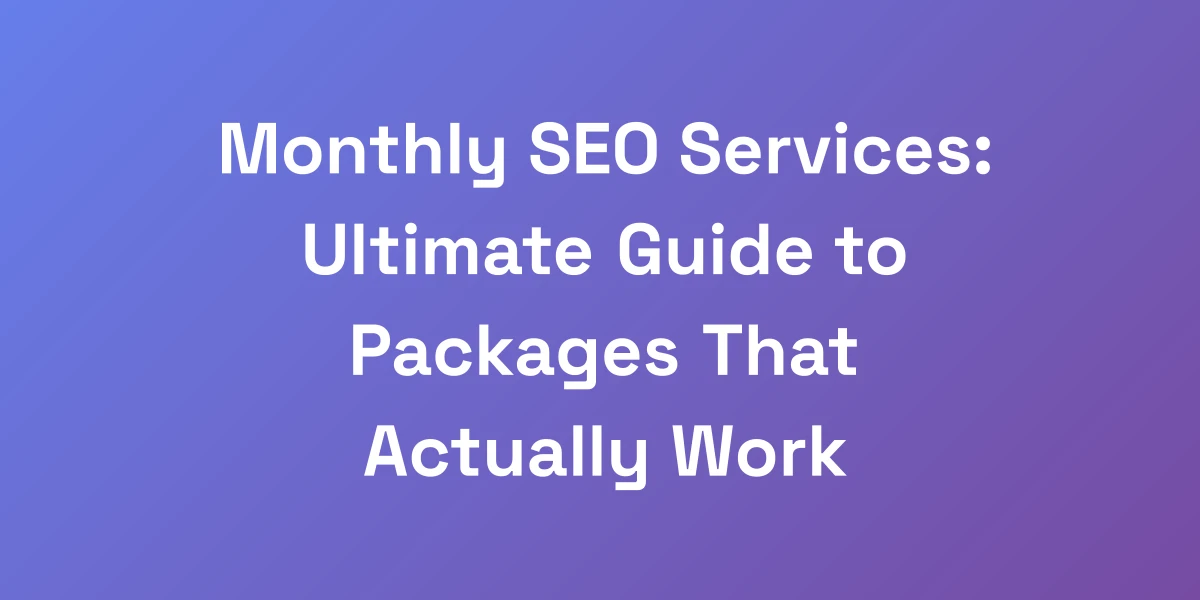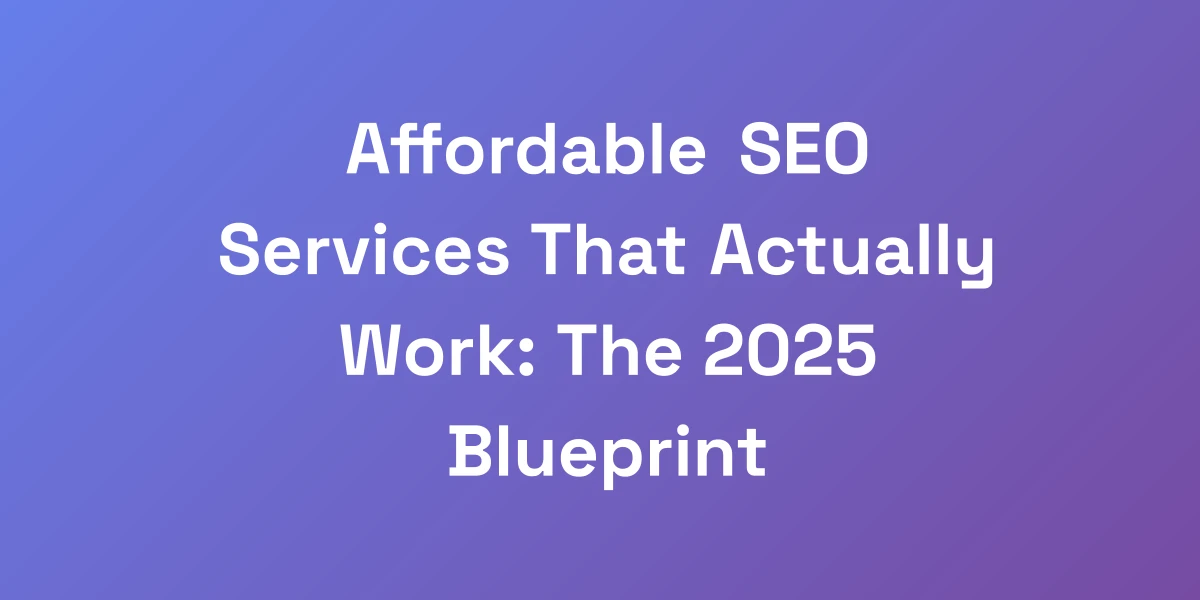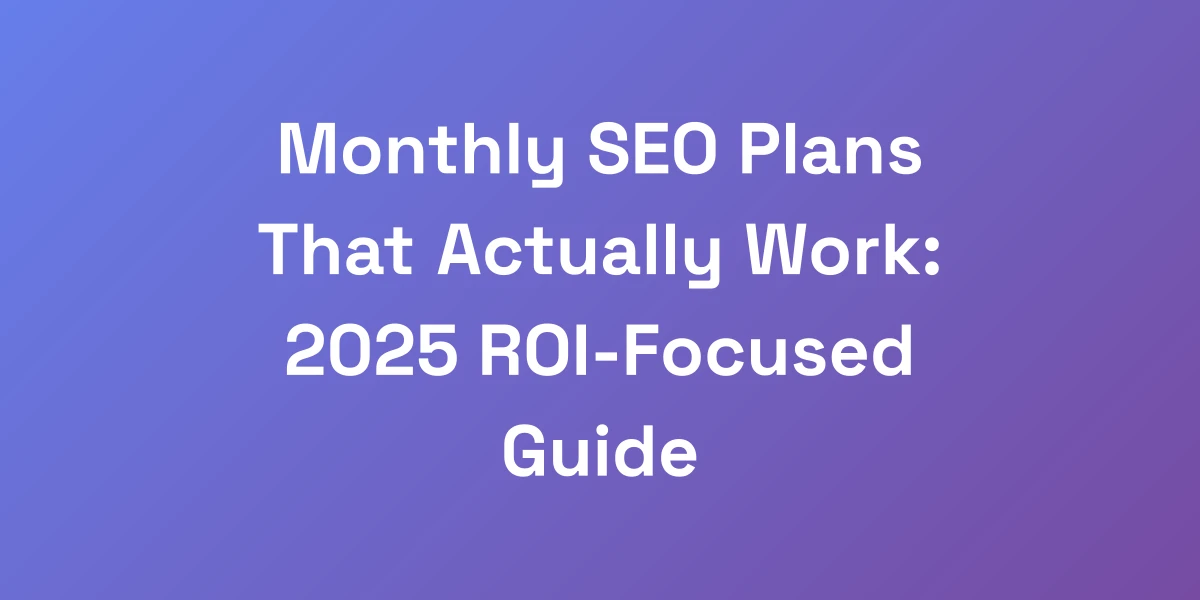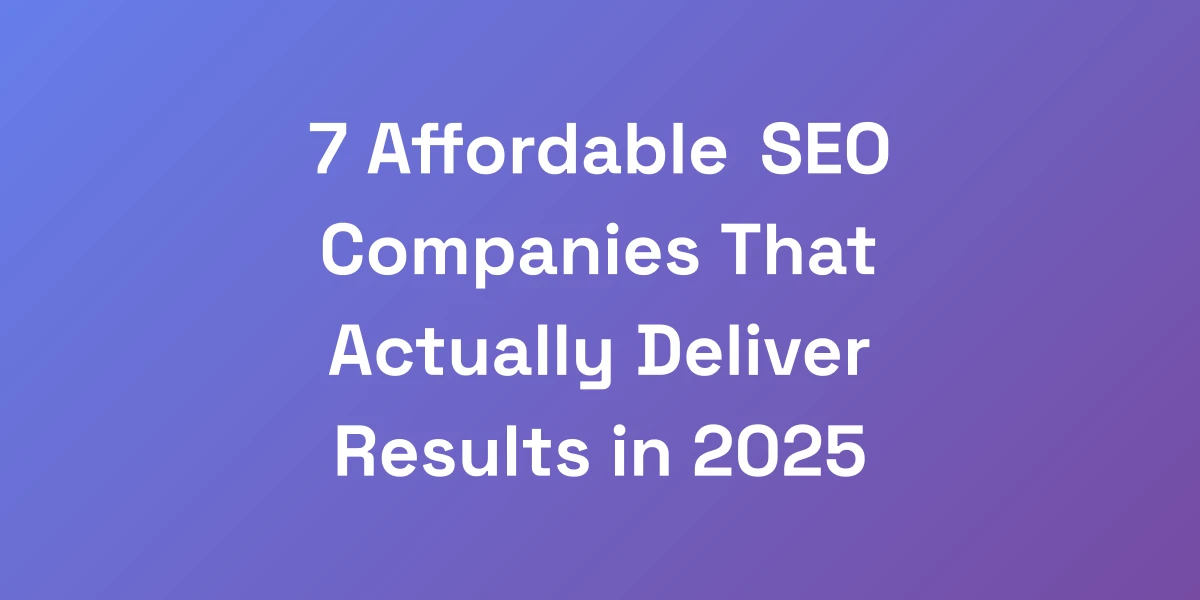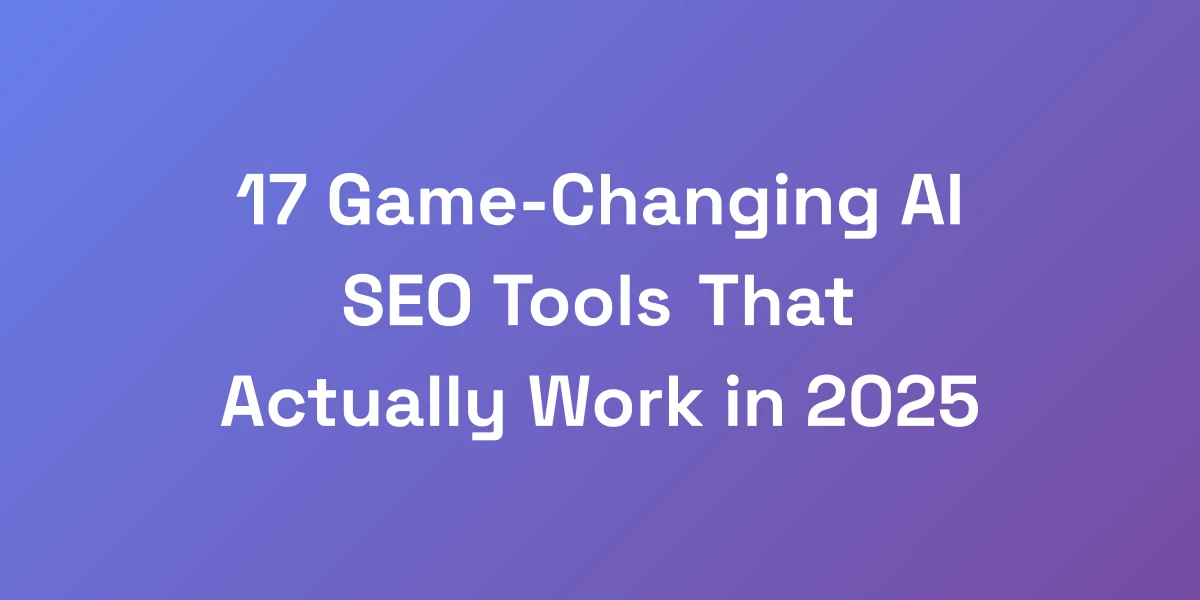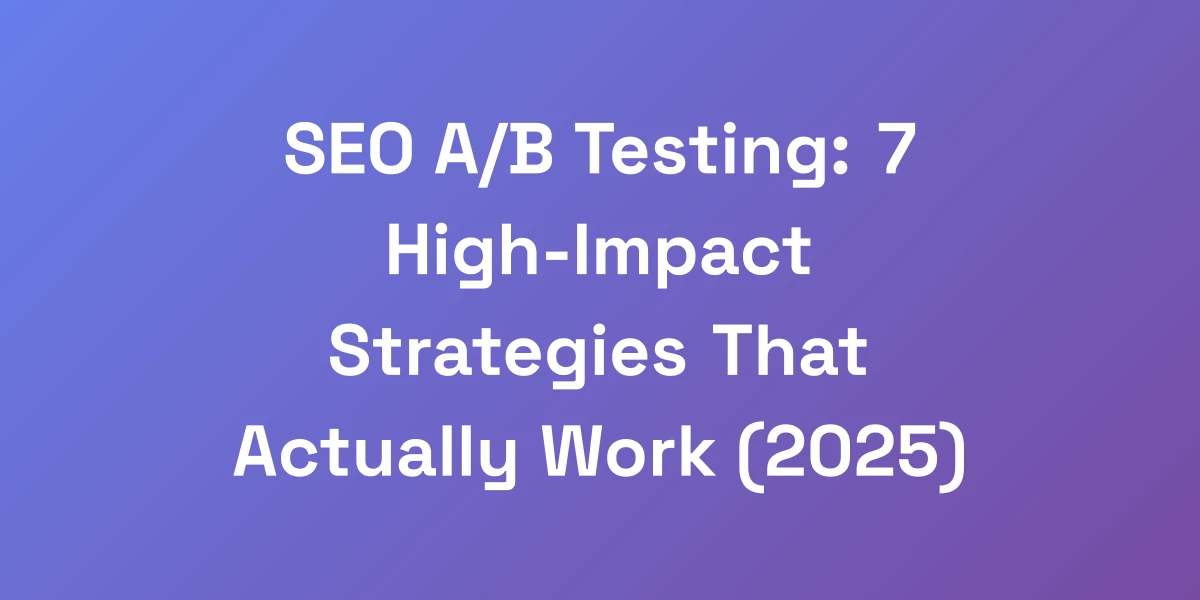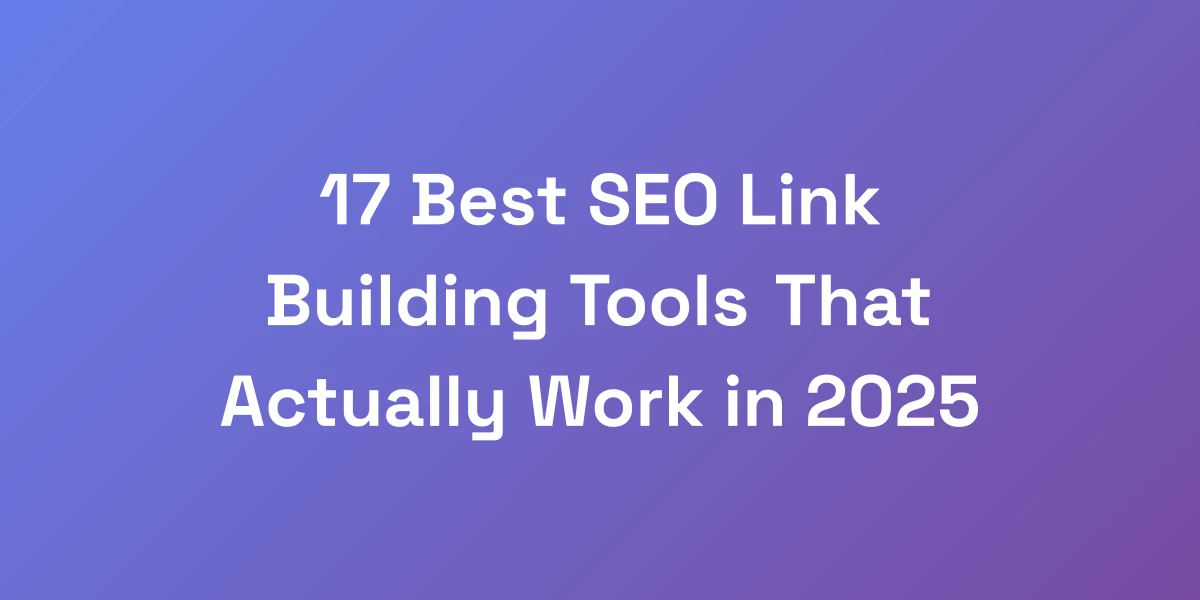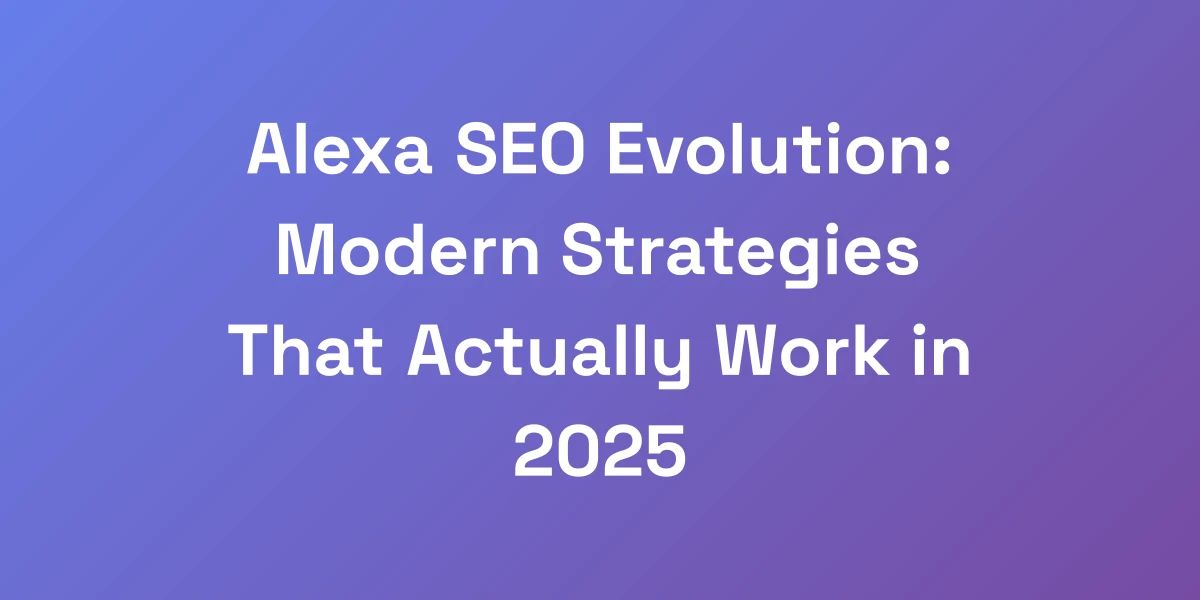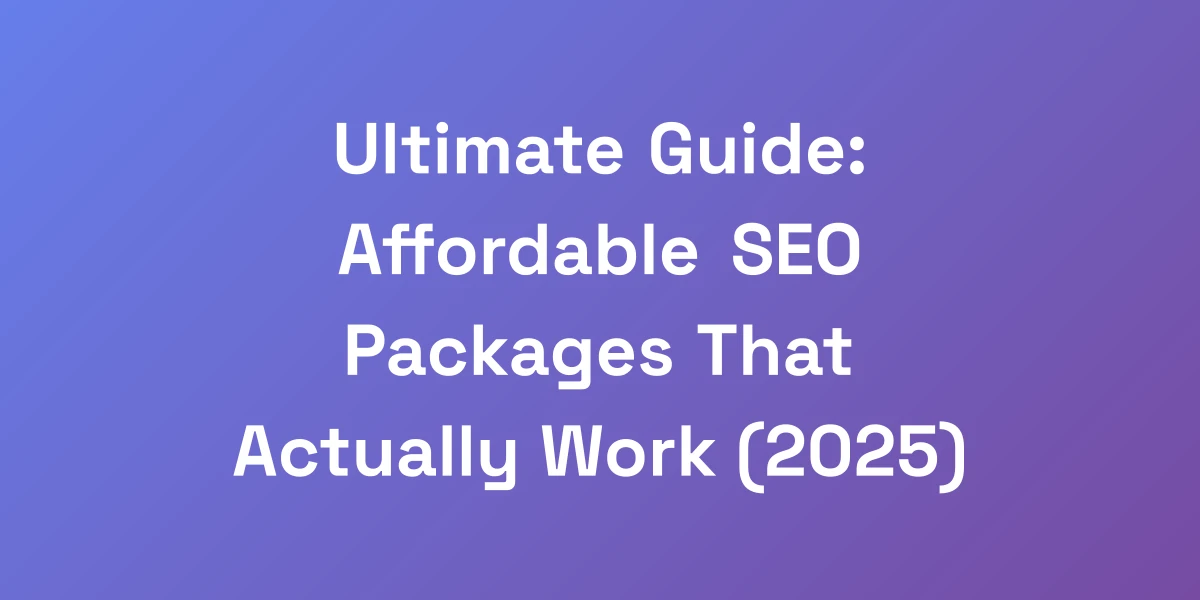
Ultimate Guide: Affordable SEO Packages That Actually Work (2025)
Mar 25, 2025 | By zishansami102@gmail.com
The Truth About “Affordable” SEO in 2025
Let me cut through the BS right now – most “affordable SEO packages” are garbage. We’ve seen countless small business owners waste thousands on fancy promises and zero results.
But here’s the reality: you don’t need to break the bank for effective SEO. What you need is to understand exactly what you’re buying and why it matters.
We’re going to show you how to spot the difference between a legitimate deal and a costly mistake because, in business, the most expensive thing is wasting money on services that don’t generate returns.
Why Most Cheap SEO Packages Fail
Cheap SEO packages often lure businesses with low prices, but what’s the real catch? These packages typically focus on quantity over quality. Think of it like buying junk food – it’s cheap and immediate, but not nourishing in the long run.
Here’s why they fail:
- Black Hat Techniques: Many affordable packages use unethical practices that can lead to penalties from search engines.
- Lack of Customization: One-size-fits-all strategies ignore the unique needs of your business, leading to poor results.
- Poor Communication: Low-cost providers often lack the resources to maintain consistent communication, leaving you in the dark about your SEO progress.
Ever felt like you’re stuck in a hamster wheel, running but not getting anywhere? That’s the typical outcome with cheap SEO packages – lots of effort, little to show for it.
The Real Cost of Quality SEO
Quality SEO isn’t just about what you pay; it’s about the value you receive. Investing in a reputable SEO package means you’re setting the stage for sustainable growth.
Here’s the breakdown:
- Comprehensive Audit: Understanding your current SEO status is crucial. This includes technical audits, keyword analysis, and competitor benchmarking.
- Quality Content Creation: Content is king, but only if it’s relevant, engaging, and optimized for search engines.
- Ongoing Optimization: SEO isn’t a one-time task. Continuous tweaking and updating are necessary to stay ahead.
Think of quality SEO as planting a tree. It takes time and resources, but the returns are long-lasting and impactful.
Setting Realistic Budget Expectations
Setting a budget for SEO can be daunting, especially with the myriad of options available. But holding out for the cheapest option often backfires. Instead, consider investing in affordable local SEO services that provide real value.
Here’s how to set realistic expectations:
- Understand Your Needs: Identify what aspects of SEO are most critical for your business – be it local SEO, technical optimization, or content creation.
- Allocate Resources Wisely: Determine how much you can afford to invest without straining your finances. Remember, consistency is key.
- Plan for the Long Haul: SEO is not a sprint; it’s a marathon. Allocate a budget that allows for sustained effort over several months.
Ever tried to diet with a day’s worth of healthy meals? That’s what a short-term SEO budget feels like. Consistent investment is what yields meaningful results.
Red Flags to Watch Out For
Not all SEO providers are created equal. Here are some red flags that indicate you might be dealing with an unreliable service:
- Guaranteed Rankings: If they promise #1 rankings overnight, they’re lying. SEO takes time and no one can guarantee specific positions.
- Lack of Transparency: If they’re vague about their strategies or unwilling to share detailed reports, that’s a major warning sign.
- One-Size-Fits-All Approach: Effective SEO is tailored. If they offer generic packages without considering your unique needs, steer clear.
Think of it like buying medicine without knowing the ingredients – risky and potentially harmful.
The Minimum Viable SEO Investment
What’s the bare minimum you need to invest in SEO to see tangible results? Based on our research, small businesses should allocate at least $500 per month.
This investment ensures:
- Basic Optimization: Covering essential areas like on-page SEO, basic keyword research, and initial link building.
- Consistent Effort: Monthly reporting and regular adjustments are made to keep the strategy effective.
- Foundation Building: Setting up the groundwork for more advanced SEO techniques as your business grows.
Imagine building a house; you need a solid foundation before adding the fancy features. The same principle applies to SEO.
Essential Components of a Legitimate SEO Package
Stop falling for packages that promise the world but deliver nothing. A legitimate SEO package needs specific components that actually move the needle.
We’re talking about measurable deliverables that directly impact your bottom line. The truth is, 80% of your results will come from 20% of the SEO activities – and we’re going to show you exactly which ones matter.
If your package doesn’t include these core elements, you’re literally throwing money away.
Technical SEO Foundations
Technical SEO is the backbone of any successful SEO strategy. It involves optimizing your website’s infrastructure to ensure search engines can crawl and index it efficiently.
- Site Speed Optimization: Fast-loading websites provide better user experiences and are favored by search engines.
- Mobile-Friendliness: With mobile searches on the rise, ensuring your site is responsive is non-negotiable.
- Structured Data: Implementing schema markup helps search engines understand your content better, improving visibility.
Consider technical SEO as the plumbing of your website – you might not see it, but without it, everything falls apart.
Content Creation & Optimization
Content is where personalities shine and numbers speak. It’s not just about creating content, but creating the right content that resonates with your audience and aligns with search intent.
- Keyword Research: Identifying the terms your potential customers are searching for.
- High-Quality Content: Creating valuable, informative, and engaging content that addresses your audience’s needs.
- On-Page Optimization: Ensuring your content is optimized with appropriate headings, meta descriptions, and internal links.
Think of your content as a conversation. If it’s not engaging and relevant, your audience will tune out. For detailed strategies on optimizing landing pages, explore our Landing Page SEO Mastery.
Local SEO Elements
For small businesses, local SEO is a game-changer. It ensures that your business appears in local search results, driving more traffic and conversions.
- Google My Business Optimization: Ensuring your business listing is complete and accurate.
- Local Citations: Getting your business listed in local directories enhances visibility and credibility.
- Reviews Management: Encouraging and managing customer reviews to build trust and improve rankings.
Imagine being a local gem that only a few know about. Local SEO Near Me makes sure everyone in your area can find you easily.
Link Building Strategies
Link building remains a critical factor in SEO. It’s about acquiring high-quality backlinks from reputable sources to boost your site’s authority.
- Guest Posting: Writing articles for other reputable sites in your industry to earn backlinks.
- Broken Link Building: Identifying broken links on other websites and offering your content as a replacement.
- Content Marketing: Creating share-worthy content that naturally attracts backlinks.
Think of backlinks as votes of confidence. The more reputable your votes, the higher your site’s authority.
Performance Tracking & Reporting
If you can’t measure it, you can’t improve it. Performance tracking is essential to understand what’s working and what needs adjustment.
- Analytics Setup: Implementing tools like Google Analytics and Google Search Console to track traffic and performance.
- Regular Reporting: Monthly reports that highlight key metrics, progress, and areas for improvement.
- SEO Audits: Periodic audits to identify and fix any issues that might be hindering your SEO efforts.
Imagine navigating without a map. Performance tracking provides the direction you need to stay on course.
Implementation Timeline
Understanding the timeline for SEO implementation helps set realistic expectations and ensures that both you and your provider are on the same page.
- Initial Phase (Month 1-2): Comprehensive audits, keyword research, and technical optimizations.
- Growth Phase (Month 3-6): Content creation, link building, and local SEO enhancements.
- Optimization Phase (Month 6+): Continuous monitoring, optimization, and scaling strategies.
Consider the timeline as a blueprint. Without it, you’re building without a plan, leading to chaos and inefficiency.
How to Calculate ROI from SEO Packages
Listen closely: if you can’t measure it, you can’t improve it. The biggest mistake small businesses make is not understanding how to calculate their SEO return on investment.
We’re going to give you the exact formula we use to determine whether an SEO package is worth the investment. We’re talking about real numbers, not vanity metrics that mean nothing to your bottom line.
When you understand this, you’ll never overpay for SEO again.
Key Performance Indicators (KPIs)
KPIs are the north stars that guide your SEO strategy. Here are the essential ones to track:
- Organic Traffic: The number of visitors coming to your site through search engines.
- Keyword Rankings: The positions of your targeted keywords in search engine results pages (SERPs).
- Conversion Rates: The percentage of visitors who take a desired action, such as making a purchase or filling out a form.
- Backlink Quality and Quantity: The number and quality of backlinks pointing to your site.
- Bounce Rate: The percentage of visitors who leave your site after viewing only one page.
Tracking these KPIs gives you a clear picture of your SEO performance and highlights areas that need improvement.
Revenue Attribution Models
Understanding how SEO contributes to your revenue is crucial for calculating ROI. Here’s how to attribute revenue to your SEO efforts:
- First-Touch Attribution: Assigning all credit to the first interaction, which is often SEO.
- Last-Touch Attribution: Giving all credit to the last interaction before conversion, which could be SEO-driven.
- Multi-Touch Attribution: Distributing credit across multiple touchpoints in the customer journey.
By applying these models, you can see exactly how SEO influences your revenue, ensuring you’re making informed investment decisions.
Traffic Value Calculation
Calculating the traffic value helps you understand how much your organic traffic is worth in monetary terms. Here’s how:
- Identify Keywords: List the keywords driving traffic to your site.
- Determine CPC: Find out the cost-per-click for each keyword using tools like Google Ads.
- Calculate Traffic Value: Multiply the number of organic visits by the CPC of each keyword.
For example, if a keyword has a CPC of $2 and you receive 100 organic visits from it, the traffic value is $200.
Conversion Rate Impact
Understanding the impact of SEO on your conversion rates is vital for ROI calculation. Here’s how to measure it:
- Track Conversions: Use tools like Google Analytics to track conversions from organic traffic.
- Calculate Conversion Rate: Divide the number of conversions by the total organic traffic.
- Assess Impact: Compare conversion rates before and after implementing SEO strategies.
Higher conversion rates from organic traffic directly translate to better ROI, showcasing the effectiveness of your SEO efforts.
Long-term Value Assessment
SEO is a long-term investment, and its value compounds over time. Assessing the long-term value involves:
- Customer Lifetime Value (CLV): Calculate the total revenue you expect from a customer over their lifetime.
- Retention Rates: Measure how well SEO helps in retaining customers through ongoing visibility and engagement.
- Brand Authority: Evaluate how SEO contributes to building your brand’s authority and trust over time.
By assessing these factors, you ensure that your SEO investment continues to pay dividends well into the future.
Comparing Popular SEO Package Price Points
I’m about to break down exactly what you should expect at every price point. No fluff, no BS – just raw value analysis.
Most agencies won’t tell you this, but there’s a sweet spot where investment meets maximum return, and it’s probably not where you think.
We’ve spent millions testing different service levels, and we’re going to show you exactly what you should be getting for your money at each tier.
Entry-Level Packages ($300-500/month)
At this price point, you’re typically getting the basics. Here’s what to expect:
- Basic Keyword Research: Identifying a handful of target keywords.
- On-Page SEO: Optimizing a limited number of pages for those keywords.
- Monthly Reporting: Basic reports on traffic and keyword rankings.
This level is suitable for businesses just starting with SEO, but be cautious – ensure they offer genuine value and not just minimalistic services without depth.
Mid-Range Solutions ($500-1000/month)
Mid-range packages offer a more comprehensive approach, balancing cost and effectiveness.
- Expanded Keyword Research: Targeting a broader range of keywords with higher potential.
- Content Creation: Developing new content pieces tailored to your audience.
- Link Building: Initiating link-building campaigns to boost domain authority.
- Local SEO Optimization: Enhancing local search presence through Google My Business and local citations.
This tier is ideal for small businesses aiming to grow their online presence without overspending.
Premium Services ($1000-2000/month)
Premium packages are for businesses serious about dominating their niche. Here’s what’s included:
- Comprehensive SEO Audits: In-depth analysis of your website’s SEO health.
- Advanced Content Strategies: Regular creation of high-quality, SEO-optimized content.
- Robust Link Building: High-quality backlinks from authoritative sites.
- Technical SEO: Ongoing technical optimizations to enhance site performance.
- Detailed Reporting: Comprehensive reports with actionable insights and recommendations.
If you’re looking to scale rapidly and outperform competitors, this tier provides the tools you need.
Enterprise-Level Offerings
For large businesses with significant SEO needs, enterprise-level packages offer:
- Custom Strategies: Tailored SEO strategies aligned with specific business goals.
- Dedicated Account Managers: Personalized support and strategy adjustments.
- Advanced Analytics: In-depth analysis and reporting with actionable insights.
- Comprehensive Services: All aspects of SEO covered, including international SEO, advanced technical optimization, and extensive content marketing.
This level is for businesses that require a holistic and aggressive approach to SEO, ensuring maximum visibility and growth.
Custom Package Considerations
Not every business fits neatly into predefined packages. Custom SEO packages allow you to:
- Tailor Services: Select the specific SEO services that align with your business needs.
- Flexible Pricing: Adjust your investment based on your budget and goals.
- Scalable Solutions: Scale services up or down as your business evolves.
Custom packages are ideal for businesses with unique requirements that standard packages cannot adequately address. Whether you’re in a specialized field like Local SEO for Attorneys or Plumbers SEO, tailored solutions ensure your specific needs are met.
Implementation Strategy for Maximum Impact
Here’s the brutal truth: even the best SEO package is worthless without proper implementation. We’re giving you our exact playbook for maximizing every dollar spent on SEO.
This isn’t theory – it’s the same strategy that’s generated millions in revenue for businesses just like yours. The key is systematic execution and knowing exactly where to focus your resources for maximum impact.
First 30 Days Action Plan
The first month sets the foundation for your SEO strategy. Here’s what to focus on:
- Comprehensive Site Audit: Identify and fix immediate technical issues.
- Keyword Identification: Finalize your target keywords based on research.
- Content Planning: Develop a content calendar aligned with your SEO goals.
- Initial Content Creation: Start producing high-quality content pieces.
Think of the first month as building the foundation of a skyscraper – everything else relies on it.
90-Day Milestone Framework
After the initial setup, it’s time to execute and refine your strategy. The first 90 days should include:
- Content Deployment: Publish and optimize new content regularly.
- Link Building Initiatives: Start acquiring high-quality backlinks.
- Local SEO Enhancements: Optimize your local listings and gather reviews.
- Performance Tracking: Monitor KPIs and adjust strategies as needed.
This phase is crucial for building momentum and starting to see initial results.
Resource Allocation Guide
Properly allocating resources ensures you’re getting the most out of your SEO investment. Here’s how to do it:
- Budget Allocation: Distribute your budget across different SEO activities based on priority and impact.
- Team Roles: Assign specific roles and responsibilities to your team members or SEO provider.
- Tool Utilization: Invest in essential SEO tools for analysis, tracking, and optimization.
Efficient resource allocation is like managing your finances – spend wisely to maximize returns.
Progress Monitoring Systems
Regular monitoring ensures you stay on track and can make informed adjustments. Implement the following systems:
- Weekly Check-ins: Review progress and address any immediate issues.
- Monthly Reports: Analyze performance data and adjust strategies accordingly.
- Quarterly Reviews: Conduct in-depth assessments of your SEO strategy’s effectiveness.
Monitoring systems are your GPS, guiding you through the complexities of SEO and keeping you on course.
Scaling Strategies
Once your SEO strategy is showing results, it’s time to scale. Here’s how:
- Expand Keyword Targets: Add more high-potential keywords to your focus.
- Increase Content Production: Invest in creating more content to cover additional topics.
- Advanced Link Building: Pursue higher-quality backlinks to further boost authority.
- Explore New Markets: Extend your SEO efforts to new geographical or demographic markets.
Scaling is about building on your success and continuously pushing for higher growth.
Conclusion
Navigating the world of affordable SEO packages for small businesses can be overwhelming, but it doesn’t have to be. By understanding the core components, setting realistic budget expectations, and implementing a strategic approach, you can find SEO solutions that deliver real, measurable results.
Remember, it’s not about finding the cheapest option – it’s about finding the right value for your investment. Whether you’re starting with an entry-level package or scaling up to premium services, focus on what truly moves the needle for your business.
Ready to take your SEO to the next level? Start by assessing your current strategy, set clear goals, and choose a package that aligns with your unique needs.
We’d love to hear about your SEO journey. What challenges have you faced, and what successes have you celebrated? Share your experiences in the comments below!
